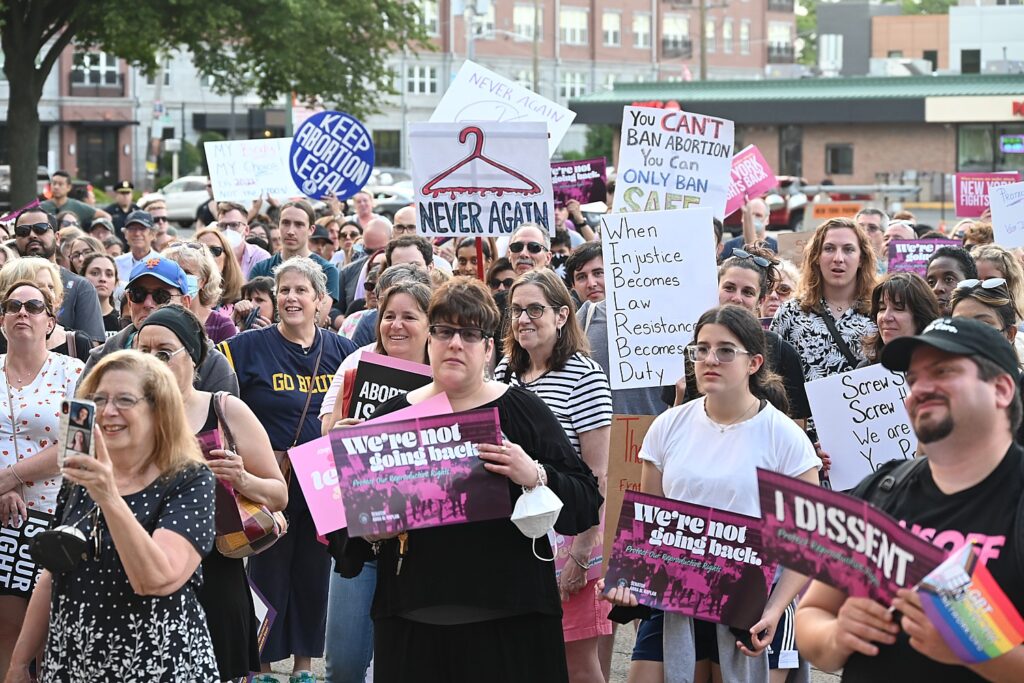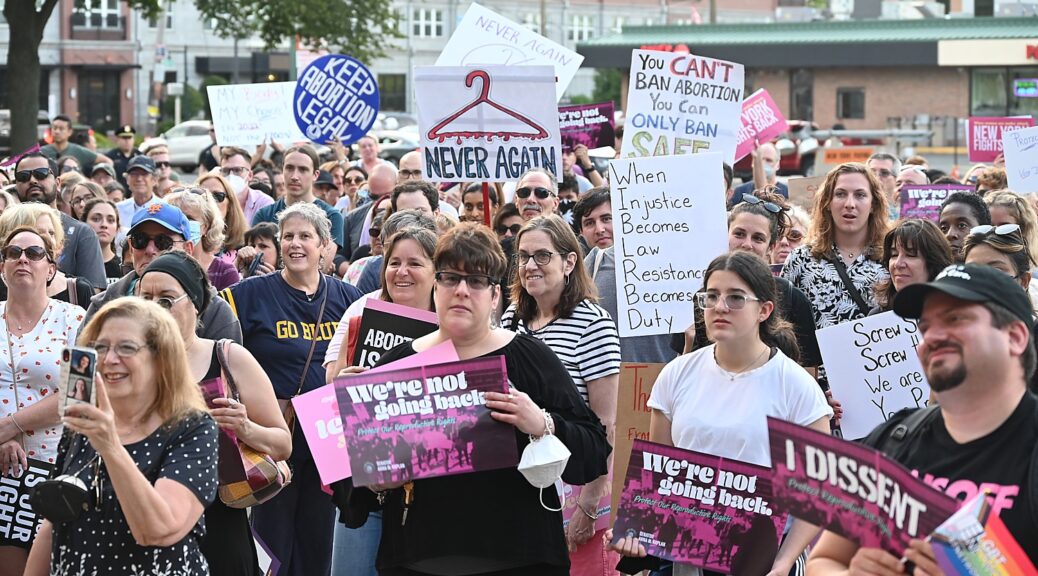
On the one-year anniversary since the radical religious ideologues on the Supreme Court overturned Roe v. Wade and women’s constitutional right to self-determination and bodily autonomy, the White House issued this fact sheet highlighting the actions the Biden Administration has taken to protect access to reproductive health care, and its ongoing commitment to defending reproductive rights.
In a statement, President Joe Biden declared,
“One year ago today, the Supreme Court took away a constitutional right from the American people, denying women across the nation the right to choose. Overturning Roe v. Wade, which had been the law of the land for nearly half a century, has already had devastating consequences.
“States have imposed extreme and dangerous abortion bans that put the health and lives of women in jeopardy, force women to travel hundreds of miles for care, and threaten to criminalize doctors for providing the health care that their patients need and that they are trained to provide.
“Yet, state bans are just the beginning. Congressional Republicans want to ban abortion nationwide, but go beyond that, by taking FDA-approved medication for terminating a pregnancy, off the market, and make it harder to obtain contraception. Their agenda is extreme, dangerous, and out-of-step with the vast majority of Americans.
“My Administration will continue to protect access to reproductive health care and call on Congress to restore the protections of Roe v. Wade in federal law once and for all.”
– Karen Rubin/news-photos-features.com
One year ago, the Supreme Court eliminated a constitutional right that it had previously recognized, overturning nearly 50 years of precedent. Today, more than 23 million women of reproductive age—one in three—live in one of the 18 states with an abortion ban currently in effect. In the last year, women have been denied essential medical care to preserve their health and even save their lives. They have been turned away from emergency rooms, forced to delay care, and made to travel hundreds of miles and across state lines for needed medical care. Despite this devastating impact on women’s health, Republican elected officials continue to advance these bans at both the state and national level.
President Biden and Vice President Harris stand with the majority of Americans who believe the right to choose is fundamental—and who have made their voices heard at every opportunity since the Supreme Court’s decision in Dobbs v. Jackson Women’s Health Organization. As the President has made clear since the day of the Dobbs decision, the only way to ensure women in every state have access to abortion is for Congress to pass a law restoring the protections of Roe v. Wade.
While we continue to call on Congress to restore these protections, the Administration has taken executive action to protect access across the full spectrum of reproductive health care. In the wake of Dobbs, the President issued two Executive Orders directing a comprehensive slate of actions to protect access to reproductive health care services, including abortion. And today, the President is issuing a third Executive Order focused on strengthening access to affordable, high-quality contraception, a critical aspect of reproductive health care. The Administration remains fully committed to implementing these Executive Orders and advancing access to reproductive health care through the leadership of the interagency Task Force on Reproductive Healthcare Access, co-chaired by the White House Gender Policy Council and the Department of Health and Human Services (HHS).
Today, the Biden-Harris Administration is providing an update on the work of the Task Force on Reproductive Healthcare Access and the Administration’s ongoing efforts to defend reproductive rights.
Protecting Access to Abortion, including Medication Abortion
- Ensure Access to Emergency Medical Care. The Administration is committed to ensuring all patients, including women who are experiencing pregnancy loss, have access to the full rights and protections for emergency medical care afforded under federal law—including abortion care when that is the stabilizing treatment required. HHS issued guidance affirming requirements under the Emergency Medical Treatment and Labor Act (EMTALA) and Secretary Becerra sentletters to providers making clear that federal law preempts state law restricting access to abortion in emergency situations. The U.S. District Court of Idaho issued a preliminary injunction blocking the enforcement of Idaho’s abortion ban as applied to medical care required by EMTALA after the Department of Justice (DOJ) filed a lawsuit seeking to enjoin Idaho’s ban to the extent it makes abortion a crime even when necessary to prevent serious risks to the health of pregnant patients.
- Defend FDA Approval of Medication Abortion in Court. The Food and Drug Administration (FDA) and DOJ are defending access to mifepristone, a safe and effective drug used in medication abortion that FDA first approved more than twenty years ago, and FDA’s independent, expert judgment in court—including in a lawsuit in Texas that attempts to eliminate access nationwide. The Administration will continue to stand by FDA’s decades-old approval of the medication and by FDA’s ability to review, approve, and regulate a wide range of prescription medications.
- Protect Access to Safe and Legal Medication Abortion. On what would have been the 50th anniversary of Roe v. Wade on January 22, President Biden issued a Presidential Memorandum directing further efforts to protect access to medication abortion, including to support patients, providers, and pharmacies who wish to legally access, prescribe, or provide mifepristone—and to safeguard their safety and security, including at pharmacies. This Presidential Memorandum was issued in the face of attacks by state officials to prevent women from accessing mifepristone and discourage pharmacies from becoming certified to dispense the medication. These attacks followed independent, evidence-based action taken by FDA to allow mifepristone to continue to be prescribed by telehealth and sent by mail as well as to enable interested pharmacies to become certified.
- Partner with State Leaders on the Frontlines of Abortion Access. Today, the White House is releasing a new report on the battle for abortion access at the state level and the Administration’s engagement with state leaders over the past year. The report underscores the Administration’s ongoing commitment to partnering with leaders on the frontlines of protecting access to abortion—both those fighting extreme state legislation and those advancing proactive policies to protect access to reproductive health care, including for patients who are forced to travel out of state for care. The Vice President has led these efforts, traveling to 18 states and meeting with more than 250 state legislators, health care providers, and advocates in the past year. And last week, the White House hosted over 80 state legislators from 41 states to discuss efforts to protect access to reproductive health care.
- Provide Access to Reproductive Health Care for Veterans. The Department of Veterans Affairs (VA) issued an interim final rule to allow VA to provide abortion counseling and, in certain circumstances, abortion care to Veterans and VA beneficiaries. VA provides abortion services when the health or life of the patient would be endangered if the pregnancy were carried to term or when the pregnancy is a result of rape or incest. When working within the scope of their federal employment, VA employees may provide authorized services regardless of state restrictions. DOJ will defend any VA providers whom states attempt to prosecute for violations of state abortion laws.
- Support Access to Care for Service Members. The Department of Defense (DoD) has taken action to ensure that Service members and their families can access reproductive health care and that DoD health care providers can operate effectively. DoD has released policies to support Service members and their families’ ability to travel for lawful non-covered reproductive health care and to bolster Service members’ privacy and afford them the time and space needed to make personal health care decisions.
- Defend Reproductive Rights in Court. DOJ created a Reproductive Rights Task Force, which monitors and evaluates state and local actions that threaten to infringe on federal protections relating to the provision or pursuit of reproductive health care, impair women’s ability to seek abortion care where it is legal, impair individuals’ ability to inform and counsel each other about the care that is available in other states, ban medication abortion, or impose criminal or civil liability on federal employees who provide legal reproductive health services in a manner authorized by Federal law.
- Defend FDA Approval of Medication Abortion in Court. The Food and Drug Administration (FDA) and DOJ are defending access to mifepristone, a safe and effective drug used in medication abortion that FDA first approved more than twenty years ago, and FDA’s independent, expert judgment in court—including in a lawsuit in Texas that attempts to eliminate access nationwide. The Administration will continue to stand by FDA’s decades-old approval of the medication and by FDA’s ability to review, approve, and regulate a wide range of prescription medications.
Supporting Women’s Ability to Travel for Medical Care
- Defend the Right to Travel. On the day of the Dobbs decisions, President Biden reaffirmed the Attorney General’s statement that women must remain free to travel safely to another state to seek the care they need. President Biden committed his administration to defending “that bedrock right,” and DOJ continues to monitor attempts to restrict a woman’s right to travel to receive lawful health care.
- Support Patients Traveling Out of State for Medical Care. HHS Secretary Becerra and CMS Administrator Chiquita Brooks-LaSure issued a letter to U.S. governors inviting them to work with CMS and apply for Medicaid 1115 waivers to provide increased access to care for women from states where reproductive rights are under attack and women may be denied medical care. HHS continues to encourage state leaders to consider and develop new waiver proposals that would support access to reproductive health care services.
- Support Patients Traveling Out of State for Medical Care. HHS Secretary Becerra and CMS Administrator Chiquita Brooks-LaSure issued a letter to U.S. governors inviting them to work with CMS and apply for Medicaid 1115 waivers to provide increased access to care for women from states where reproductive rights are under attack and women may be denied medical care. HHS continues to encourage state leaders to consider and develop new waiver proposals that would support access to reproductive health care services.
Safeguarding Access to Contraception
- Strengthen Access to Affordable, High-Quality Contraception. Today, the President issued an Executive Order directing agencies to: improve access and affordability for women with private health insurance; promote increased access to over-the-counter contraception; support access to affordable contraception through Medicaid and Medicare; ensure Service members, veterans, and Federal employees are able to access contraception; bolster contraception access across Federal health programs; and support access for college students and employees. The Task Force on Reproductive Healthcare Access will oversee the swift and robust implementation of this Executive Order in the coming months.
- Clarify Protections for Women with Private Health Insurance. Under the Affordable Care Act, most private health plans must provide contraception and family planning counseling with no out-of-pocket costs. The Departments of the Treasury, Labor, and HHS convened a meeting with health insurers and employee benefit plans. These agencies called on the industry to meet their obligations to cover contraception as required under the law. Following this conversation, these agencies issued guidance to clarify protections for contraceptive coverage under the Affordable Care Act.
- Expand Access Under the Affordable Care Act. The Departments of the Treasury, Labor, and HHS proposed a rule to strengthen access to contraception under the Affordable Care Act so all women who need and want contraception can obtain it. Millions of women have already benefited from this coverage, which has helped them save billions of dollars on contraception.
- Support Title X Clinics. HHS provided resources to bolster quality family planning services through the Title X Family Planning Program, including funding to help clinics deliver equitable, affordable, client-centered, and high-quality family planning services and provide training and technical assistance for Title X clinics. In addition, recognizing the important role that Title X clinics play in supporting access to contraception, the President’s Fiscal Year 2024 Budget Request includes $512 million for the Title X Family Planning Program, a 76 percent increase above the 2023 enacted level.
- Promote Access to Contraception for Service Members and Their Families and Certain Dependents of Veterans. To improve access to contraception at military hospitals and clinics, DoD expanded walk-in contraceptive care services for active-duty Service members and other Military Health System beneficiaries, and eliminated TRICARE copays for medical contraceptive services. And VA proposed a rule to eliminate out-of-pocket costs for certain types of contraception through the Civilian Health and Medical Program of the Department of Veterans Affairs.
- Clarify Protections for Women with Private Health Insurance. Under the Affordable Care Act, most private health plans must provide contraception and family planning counseling with no out-of-pocket costs. The Departments of the Treasury, Labor, and HHS convened a meeting with health insurers and employee benefit plans. These agencies called on the industry to meet their obligations to cover contraception as required under the law. Following this conversation, these agencies issued guidance to clarify protections for contraceptive coverage under the Affordable Care Act.
Reinforcing Nondiscrimination Protections under Federal Law
- Issue Guidance to Retail Pharmacies. HHS issued guidance to roughly 60,000 U.S. retail pharmacies to remind them of their obligations under federal civil rights laws to ensure access to comprehensive reproductive health care services. The guidance makes clear that as recipients of federal financial assistance, pharmacies are prohibited under law from discriminating on the basis of race, color, national origin, sex, age, and disability in their programs and activities. This guidance is especially important in the wake of reports that women of reproductive age have been denied prescription medication at pharmacies—including medication that is used to treat stomach ulcers, lupus, arthritis, and cancer—due to concerns that these medications could be used to terminate a pregnancy.
- Protect Students from Discrimination Based on Pregnancy. The Department of Education (ED) released a resource for universities outlining their responsibilities not to discriminate on the basis of pregnancy or pregnancy-related conditions, including termination of pregnancy. This guidance reminds schools of their existing and long-standing obligations under Title IX.
- Strengthen Nondiscrimination in Healthcare. HHS announced a proposed rule to strengthen nondiscrimination in health care. The proposed rule implements Section 1557 of the Affordable Care Act and affirms protections consistent with President Biden’s executive orders on nondiscrimination based on sexual orientation and gender identity.
- Protect Students from Discrimination Based on Pregnancy. The Department of Education (ED) released a resource for universities outlining their responsibilities not to discriminate on the basis of pregnancy or pregnancy-related conditions, including termination of pregnancy. This guidance reminds schools of their existing and long-standing obligations under Title IX.
Promoting Safety and Security of Patients, Providers, and Clinics
- Promote Safety and Security of Patients, Providers and Clinics. DOJ continues to robustly enforce the Freedom of Access to Clinic Entrances Act, which protects the right to access and provide reproductive health services.
Safeguarding Privacy and Sensitive Health Information
- Strengthen Reproductive Health Privacy under HIPAA. HHS issued a proposed rule to strengthen privacy protections under the Health Insurance Portability and Accountability Act (HIPAA). This rule would prevent an individual’s information from being disclosed to investigate, sue, or prosecute an individual, a health care provider, or a loved one simply because that person sought, obtained, provided, or facilitated legal reproductive health care, including abortion. By safeguarding sensitive information related to reproductive health care, the rule will strengthen patient-provider confidentiality and help health care providers give complete and accurate information to patients. Prior to the proposed rule and immediately after Dobbs, HHS issued guidance reaffirming HIPAA’s existing protections for the privacy of individuals’ protected health information.
- Take Action Against Illegal Use and Sharing of Sensitive Health Information. The Federal Trade Commission (FTC) has committed to enforcing the law against illegal use and sharing of highly sensitive data, including information related to reproductive health care. Consistent with this commitment, the FTC has taken first-of-its-kind enforcement actions against companies for disclosing consumers’ personal health information, including highly sensitive reproductive health data, without permission.
- Help Consumers Protect Their Personal Data. The Federal Communications Commission (FCC) launched a new guide for consumers on best practices for protecting their personal data, including geolocation data, on mobile phones. The guide follows a recent Notice of Proposed Rulemaking issued by FCC that would strengthen data breach rules to provide greater protections to personal data. In addition, separately, HHS issued a how-to guide for consumers on steps they can take to better protect their data on personal cell phones or tablets and when using mobile health apps, like period trackers, which are generally not protected by HIPAA.
- Protect Students’ Health Information. ED issued guidance to over 20,000 school officials to remind them of their obligations to protect student privacy under the Family Educational Rights and Privacy Act (FERPA). The guidance helps ensure that school officials—including those at federally funded school districts, colleges, and universities—know that, with certain exceptions, they must obtain written consent from eligible students or parents before disclosing personally identifiable information from students’ educational records, which may include student health information. The guidance encourages school officials to consider the importance of student privacy, including health privacy, with respect to disclosing student records. ED also issued a know-your-rights resource to help students understand their privacy rights for health records at school.
- Safeguard Patients’ Electronic Health Information. HHS issued guidance affirming that doctors and other medical providers can take steps to protect patients’ electronic health information, including their information related to reproductive health care. HHS makes clear that patients have the right to ask that their electronic health information generally not be disclosed by a physician, hospital, or other health care provider. The guidance also reminds health care providers that HIPAA’s privacy protections apply to patients’ electronic health information.
Providing Access to Accurate Information and Legal Resources
- Ensure Easy Access to Reliable Information. HHS launched and maintains ReproductiveRights.gov, which provides timely and accurate information on people’s right to access reproductive health care, including contraception, abortion services, and health insurance coverage, as well as how to file a patient privacy or nondiscrimination complaint. DOJ also launched justice.gov/reproductive-rights, a webpage that provides a centralized online resource of the Department’s work to protect access to reproductive health care services under federal law.
- Hosted a Convening of Lawyers in Defense of Reproductive Rights. The Department of Justice and the Office of White House Counsel convened more than 200 lawyers and advocates from private firms, bar associations, legal aid organizations, reproductive rights groups, and law schools across the country for the first convening of pro-bono attorneys, as directed in the first Executive Order. Following this convening, reproductive rights organizations launched the Abortion Defense Network to offer abortion-related legal defense services, including legal advice and representation.
- Launch a National Hotline to Enable Access to Accurate Information. HHS issued a Notice of Funding Opportunity to establish a safe and secure national hotline to provide referral services to women in need of accurate information about their legal reproductive health care options. The nondirective hotline will provide information to patients served by the Title X family planning program who request information related to prenatal care and delivery; infant care, foster care, or adoption; or pregnancy termination.
- Hosted a Convening of Lawyers in Defense of Reproductive Rights. The Department of Justice and the Office of White House Counsel convened more than 200 lawyers and advocates from private firms, bar associations, legal aid organizations, reproductive rights groups, and law schools across the country for the first convening of pro-bono attorneys, as directed in the first Executive Order. Following this convening, reproductive rights organizations launched the Abortion Defense Network to offer abortion-related legal defense services, including legal advice and representation.
Promote Research and Data Collection
- Use Data to Track Impacts on Access to Care. HHS will convene leading experts to discuss the state of existing reproductive health research and what the data tells us about the impact of the Dobbs decision, as well as the future of research on reproductive health care access. These convenings will help identify research gaps, opportunities for collaboration, and ways to bolster research efforts for both Federal agencies and external partners.
Leverage Maternal Health Data to Address Disparities. FCC has committed to the swift implementation of the Data Mapping to Save Moms’ Lives Act, which directs FCC, in coordination with the Centers for Disease Control and Prevention, to incorporate publicly available data on maternal mortality and morbidity into its Mapping Broadband Health in America platform. This innovation will support women’s health by informing efforts to expand broadband access—including access to telehealth—in areas with poor maternal health outcomes. FCC will continue to explore opportunities to improve research, data collection, data analysis, and interpretation in the context of reproductive health care and maternal health outcomes.



